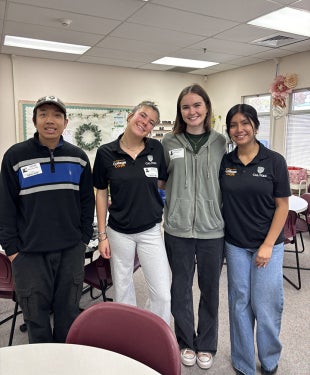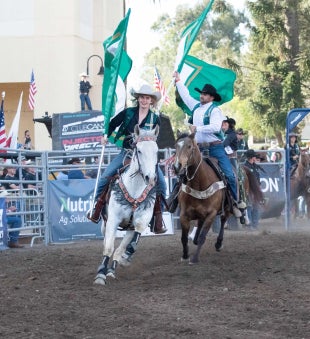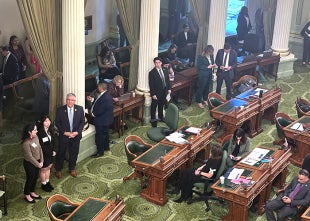Cal Poly Funds 17 Faculty Research Projects through the Research, Scholarly and Creative Activities Grant Program
Contact: Keegan Koberl
805-458-9302; kkoberl@calpoly.edu
SAN LUIS OBISPO — Cal Poly’s division of Research, Economic Development and Graduate Education (R-EDGE) announced 17 awards for the 2023-24 cycle of the Research, Scholarly and Creative Activities (RSCA) grant program.
Supported by funds from the California State University (CSU) Chancellor's Office and the Cal Poly Provost's Office, the RSCA grant program is designed to enable faculty to contribute new knowledge through robust programs of scholarship focused on strengthening California socially, culturally and economically.
“Our faculty continue to impress us with innovative proposals that center student experiences and highlight the quality and depth of research that happens across our campus”, said Sarah Lester, chair of the grants review committee of the Cal Poly Academic Senate.
This year, R-EDGE received 44 proposals and awarded over $270,000 in funds to 17 projects.
“The role of research, scholarly and creative activities is crucial to fostering intellectual vibrancy and the Learn by Doing culture at Cal Poly,” said Cynthia Jackson-Elmoore, Cal Poly’s provost and executive vice president for Academic Affairs. “Supporting faculty in advancing their scholarship and partnering in discovery with their colleagues and student collaborators is and will continue to be a priority.”
The RSCA program, active at Cal Poly since 2014-15, has provided over $3 million in grants to faculty members over this period.
The 2023-24 awarded projects are:
- “Bringing City Planning Can.on to YouTube: A Video Textbook”; Dave Amos (City and Regional Planning).
- "Local Implementation of an AI-generated Legislative News Tipsheet"; Kim Bisheff (Journalism).
- "Analyzing Methodological Attributes of 'Systematized Reviews'"; Leyla Cabugos (Kennedy Library).
- "Watching for Sasquatch: A New Environmental Play"; Ramón Esquivel (Theatre and Dance).
- "Using Wastewater to Study SARS CoV2 Evolution"; Pat Fidopiastis (Biological Sciences).
- "Social Policy and Extreme Weather: How Tightly Woven is Our Safety Net?"; Leanne Giordono (Political Science).
- "Climate Change and Alpine Plant Community Shifts in California"; Dena Grossenbacher (Biological Sciences).
- "Learning Factory – A Roadmap for the Transition from Industrial Technology to Smart Manufacturing"; Rafael Guerra Silva (Industrial Technology and Packaging).
- "Design of Multi-DOF Worm Origami Robot"; Mohammad Hasan (Mechanical Engineering).
- "Africancalifornios.org: Data Visualizations that Explain the Role of Afro-descendants in Early Spanish and Mexican California (1768-1850)"; Cameron Jones (History) and Foaad Khosmood (Computer Engineering/Computer Science and Software Engineering).
- "Multidisciplinary Computational Research for Undergraduate Students"; Joyce Lin, Paul Choboter, Elena Dimitrova and Warren Roche, (Mathematics).
- "Educational Context and Investments in Child Health Across Africa"; Sara Lopus (Social Sciences).
- "Assessment and Digitization of the Plant Sciences Entomology Collection"; Ryan Perry (Plant Sciences).
- "User Experience for Social Impact: Establishing a University-Nonprofit Collaboration"; Krista Sarraf (English), Hocheol Yang (Graphic Communication), David Gilette (English/ Liberal Arts and Engineering Studies) Michael Haungs (Computer Science and Software Engineering/ Liberal Arts and Engineering Studies), Franz Kurfess (Computer Science and Software Engineering) and Emily Robinson (Statistics).
- "The Use of AI-Created Selfies in a Public Service Announcement (PSA) Campaign Targeting College Students: The Impact of Self-Reference on Issue Relevance and Engagement."; Yan Shan (Journalism) and Ruoxi Rachel Ma (Graphic Communication).
- "Sustainable Development of Sensing Nanocomposites for Structural Health Monitoring"; Long Wang (Civil and Environmental Engineering).
- "'The Variety Problem’: Exploring Intra-Varietal Heterogeneity of an Heirloom Wheat"; Nicholas Williams (Natural Resources Management & Environmental Sciences).



